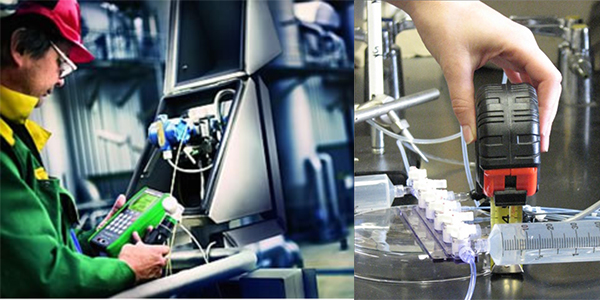Instrumentation Engineering is specialized branch of Electrical and Electronic engineering. Instrumentation engineering focuses on the principle and operation of measuring instruments, which are used in design and configuration of automated systems. The professionals who are involved in these activities are known as instrumentation engineers. Instrumentation engineers usually have degrees in instrumentation engineering, chemical engineering, electrical engineering, or mechanical engineering and sometimes in the newer fields of Control engineering, control systems engineering etc.
Instrumentation Engineering work in industries with automated processes, such as chemical or manufacturing plants with the goal of improving system productivity, reliability and stability. They help in the designing, construction and maintenance of instruments and entire instrumentation systems of an industrial undertaking. An instrumentation engineer decides the type of instruments needed for ensuring better quality and efficiency of the end product.
Instrumentation engineering is a branch of electrical and electronic engineering that is concerned with the study of engineering principles and procedures of computing instruments used in designing and assembling automated systems. The work of instrumentation engineers is critical in the industrial manufacturing sector as they are required to construct, design, and maintain instruments and systems of an industry and decide on the type of instruments needed for better quality and efficiency of the products. Instrumentation engineers need to possess creative skills, in addition to technical expertise. They should have the ability to write custom software applications as well as computer programs relating to the proposed objectives. They should also be familiar with operating elementary machinery systems and industrial tools. Owing to rapid industrial and economic growth, job opportunities in this sector are increasing every day.
Also check : Career in Computer Science Engineering
Scope in Instrumentation Engineering :
Large number of Job opportunities in Oil, Gas, Petroleum, Electronics, Construction, Manufacturing Industries.
Skills Required :
Personal attributes.
An instrumentation engineer need to have a sharp, analytical and practical mind and attention to detail. They should be able to grasp and adapt to new and changing concepts. Good communication skills are also important to communicate their ideas to others in their field. He should be good at organizing and solving problems. He may need to work under pressure and have the ability to keep calm during crisis. Along with various other personal attributes one must also have dedication and commitment towards the profession.
A successful engineer possesses not only an understanding of his area of concentration, but also a broad grasp of engineering in general.
Eligibility & Admission Process for Instrumentation Engineering :
The eligibility criterion for admissions to a bachelor’s programme is a 10+2 pass in the Science stream with Physics, Chemistry, and Mathematics as core subjects. Students must go through entrance exams such as GATE for admissions to BTech courses.
Also check : Engineering in Aeronautical
Instrumentation Engineering Colleges :
- B M Sreenivasaiah College of Engineering, Karnataka.
- B.V.B. College of Engineering & Technology, Karnataka.
- Bangalore Institute of Technology, Karnataka.
- Bharti Vidyapeeth College Of Engineering, Maharashtra.
- BMS College Of Engineering, Karnataka.
- Dayananda Sagar Institute of Technology, Karnataka.
- M S Ramaiah Institute of Technology, Karnataka.
Job Prospects & Salaries :
Owing to rapid industrial and economic growth, job opportunities in this sector are increasing every day. They find jobs in various sectors including R&D units of public and private sector companies, heavy industries such as thermal power stations, steel plants, refineries, cement and fertilizer plants etc. Companies manufacturing specialized instruments and the user industries themselves, both in public as well as private sectors, employ Instrumentation Engineering .
Senior level positions are occupied with a Masters Degree and they carry the highest level of responsibility and may include planning and managing activities, as well as leading on new developments.
They are absorbed by the IT industry in system design and control automation, in automobile industries in devising and controlling of navigational and control devices, some of the private sector companies like General Electric, Siemens, T.A.T.A, Aditya Birla Group etc. are a few to name among others and in public sector companies like HAL, B.H.E.L etc.
Instrumentation Engineers have a multidisciplinary role to play. One may choose to move sideways into other career areas either within or outside their industry. This might include areas such as purchasing, sales, marketing, finance, HR, IT or general management.
Those who have an aptitude use the expertise they have gained in the industry and engage in academic research in universities. Another option is that of teaching, those with talent in teaching can join engineering institutes or IITs as professors or lecturers.
Remuneration :
A fresh Instrumentation Engineering graduate can earn a salary of Rs. 10,000 to Rs. 15,000 per month excluding other allowances. In the government sector, the salary range of diploma holders is Rs. 12,000 to Rs. 15,000 per month. Lecturers in colleges can earn a starting salary of Rs. 12,000–Rs. 13,000 per month. Senior engineers can earn anywhere between Rs. 30,000 and Rs. 50,000 a month. Those at management levels can earn up to Rs. 60,000 or even more.





